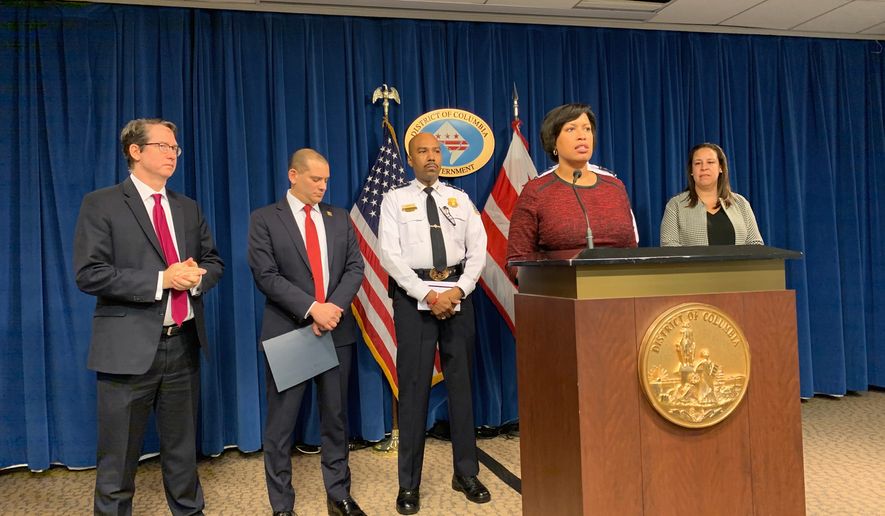D.C. Mayor Muriel Bowser said Thursday that her government is taking steps to ensure the District’s safety amid heightened tension between the U.S. and Iran but stressed “there are no immediate threats to Washington D.C.” while making a pitch for statehood.
“We cannot let this moment pass without mentioning a sad truth: The 705,000 people who call D.C. home and pay taxes will not participate in any votes in Congress related to military action,” Miss Bowser said during a press conference with other city officials. “We have 10,000 D.C. residents currently serving on active duty, but zero votes in Congress.”
Miss Bowser said she has received security and intelligence briefings from the federal government since the Jan. 3 U.S. drone strike that killed Iranian Gen. Qassem Soleimani in Baghdad. She said she is ramping up cyber and physical security efforts in the city.
“On the cyber front, the District is laser-focused on the threat emanating from Iran and its proxies,” said Christopher Rodriguez, director of the D.C. Homeland Security and Emergency Management Agency (HSEMA). “We know Iran is a sophisticated cyber adversary, having been responsible for several high profile attacks against us interests in the last several years.”
Lindsey Parker, director of the Office of the Chief Technology Officer, that since drone attack, she has not seen a spike in cyberattacks to the District’s network, which she says has about 40,000 users on a daily basis and a few billion attempts to hack the network yearly.
Ms. Parker operates a 24/7 operations center that monitors the D.C. computer network, and she said officials are monitoring cyberthreats across the country.
Mr. Rodriguez said his agency is sharing intelligence with the District’s utility and infrastructure partners such as Pepco, Washington Gas, D.C. Water and Metro, in an effort to help them prepare against a potential cyberattack.
Common cyberattacks that Iran has conducted in the past include distributed denial of service attacks, website defacements and sometimes phishing campaigns against networks, Mr. Rodriguez said.
To prepare against physical threats, the Metropolitan Police Department (MPD) has increased the presence of officers on an overtime basis across the city, specifically at government buildings, critical infrastructure and religious organizations.
Jeffrey Carroll, assistant chief of MPD’s homeland security division, said MPD and HSEMA have personnel embedded in federal law enforcement agencies, such as the Department of Homeland Security and the FBI, to remain in constant contact on security issues.
“I cannot stress enough to our listeners and viewers, trust your gut, if something doesn’t look or feel right, it usually isn’t,” Mr. Rodriguez said. “You are our first line of defense and our most important partner in ensuring that we can all live, work and thrive here in the greatest city in the world.”
• Sophie Kaplan can be reached at skaplan@washingtontimes.com.




Please read our comment policy before commenting.